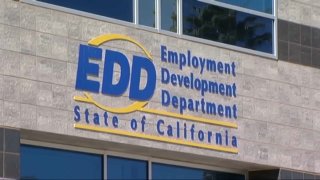
California is reporting a surge in coronavirus unemployment claims last week for independent contractors, gig workers and the self-employed — the category of benefits blamed for much of the state's fraudulent payments.
The state last week received more than 110,800 Pandemic Unemployment Assistance claims, an increase of more than 77,00 from the week before. It was so large it accounted for more than a quarter of all such claims nationally, according to numbers released Thursday by the U.S. Department of Labor.
The claims fall under a program Congress approved last year to give unemployment benefits to people during the pandemic who are usually ineligible to receive them. The program has helped a lot of people who are self-employed weather economic shutdowns from the virus. But its broad eligibility requirements have made it a target of criminals seeking easy paydays.
State officials, including Gov. Gavin Newsom, have repeatedly blamed the unemployment benefits program for the self employed as the source of much of the state's fraud. Last year, the state acknowledged it paid $400 million in fraudulent benefits in the names of 20,000 prison inmates. An analysis of 345,000 frozen accounts last year by Bank of America estimated the state paid at least $2 billion in fraudulent claims.
And Blake Hall, founder and CEO of ID.me, told the Los Angeles Times last week that at least 10% of all claims submitted before the state put in new safeguards in October may have been fraudulent — which could result in nearly $10 billion in fraudulent payments.
The number of unemployment claims for contractors and gig workers fell significantly after the state imposed new safeguards, until Thursday when a massive increase was reported.
Loree Levy, deputy director of public affairs for the Employment Development Department, said state officials expected that increase after Congress approved an extension of benefits as part of a coronavirus relief package in December.
Local
Levy said it took a few weeks for the state to implement the additional 11 weeks of benefits that Congress approved, causing a delay for some new claims during that period. Plus, she said another round of business restrictions in December because of a surge of coronavirus hospitalizations likely increased the number of people filing for new claims.
But Michael Bernick, a former EDD director who is now an attorney with the Duane Morris law firm, said the numbers “make no sense” because the increase the state reported was all for new claims, not existing claims.
Most independent contractors in California that have been impacted by the pandemic should already have filed their claims in the previous nine months, he said. Their benefits would be extended under the new congressional aid package, but those benefits should not have shown up as new claims.
“These numbers suggest that the identify-theft rings from throughout the world have not halted efforts, and fraud remains a main issue,” Bernick said.
The state has been overwhelmed with unemployment claims since March, when Gov. Gavin Newsom imposed the nation’s first statewide stay-at-home order that shuttered many businesses. The state has processed more than 19 million claims and paid out more than $113 billion in benefits.
About 4 million of those claims claims and $43 billion of those payments payments fall under the program for independent contractors.
California was flooded with claims in the early days of the pandemic after Newsom imposed stay-at-home orders in mid-March that closed most businesses. The department managed to resolve most of a backlog that peaked last year at 1.6 million claims. But the pile has grown again and now stands at more than 800,000 people.
Newsom imposed a new stay-at-home order on much of the state in December after a surge in new coronavirus cases, hospitalizations and deaths. Newsom extended those orders in many regions this month. But he lifted the order for the counties in and around the state capital.
Republican Assemblyman Jim Patterson, a frequent critic of Newsom's handling of the state's unemployment claims, said he his office has been inundated with calls from constituents in recent weeks seeking help obtaining unemployment benefits, an indication that many have again lost their jobs because of the lingering restrictions on businesses.
Patterson said he suspects the increase in claims is likely a mix of fraudulent and legitimate claims, noting state officials have not been able to tell the difference. Last month, the state froze an additional 1.4 million claims because of fraud suspicions, prompting an outcry from people who say their legitimate benefits were halted.
“Legitimate people are being denied and we can’t really get a handle by how much fraud is still out there,” he said. “The fraudsters are still attacking the system and getting paid and those who should be getting paid are finding it more and more difficult.”
The safeguards the department has put in place have made it much harder for people to file fraudulent claims, said El Dorado District Attorney Vern Pierson, president of the California District Attorneys Association and one of many prosecutors investigating fraudulent unemployment claims statewide.
Pierson said he believes the spike in claims is likely related to the recent surge in COVID-19 cases and accompanying business restrictions that have hurt the economy.
But no system is foolproof, he said.
“Criminals are still trying to defeat the system,” Pierson said. “It can be defeated.”
The state has not said how many fraudulent claims it has paid. State Auditor Elaine Howle is scheduled to release two audits of the department next week.



